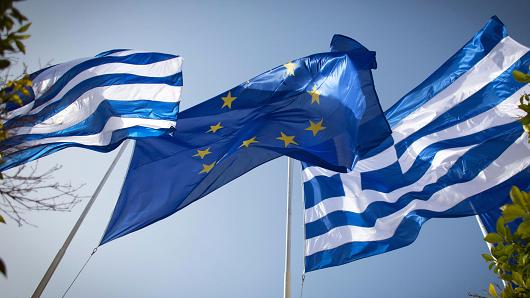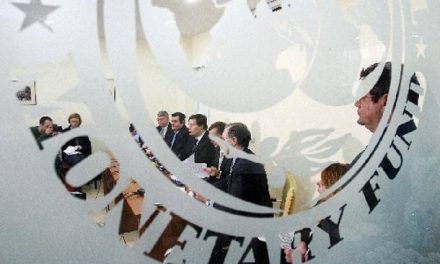By LIZ ALDERMAN, New York Times
PARIS — By now it has become familiar: Greece warns that it is about to run out of cash, then manages to scrape together enough to avoid defaulting on its debts. A larger catastrophe is averted in the eurozone, and Greece and its creditors return to haggling over whether the country can get more financial aid.
That sequence played out again this week, when Greece managed on Tuesday to make a loan payment of about 750 million euros, or about $837 million, to the International Monetary Fund. From now through the autumn, Greece will repeatedly run this obstacle course, needing to find tens of billions more to pay other debts owed to creditors and to meet basic obligations like salaries and pensions for government workers.
But Greece cannot keep the game up for long. Its economy has taken a turn for the worse, reversing a mild recovery that started last year. And analysts say growth is unlikely to recover any time soon, prolonging a cycle of dependence in which Greece continues to lean on creditors to help pay its debts.
Tuesday’s payment was an example. Continuing the cycle, the money Greece used to pay the I.M.F. came from a special reserve the fund requires all of its member nations to maintain. In other words, Greece used I.M.F. money to pay the I.M.F. And the money Greece is cobbling together to make other payments has come in part from state entities and municipal authorities.
Unless Greece’s foreign creditors agree to forgive some of the country’s €324 billion debt, sustainable economic growth will be increasingly difficult to achieve, economists say. Making matters worse, bank depositors and investors will have less incentive to keep their money in Greece.
“Indications are that the economy is relapsing,” said Mohamed A. El-Erian, the chief economic adviser at Allianz and a former executive at Pimco. “Last year’s momentum, along with the beneficial impact of lower oil prices and a weaker euro, is being overwhelmed by increased capital flight and policy uncertainties as negotiations with European partners drag on.”
The longer this economic and financial situation persists, he said, “the larger the risk of a large accident — a Graccident — that would undermine further Greece’s recovery potential and cause even greater human tragedy.”
Prime Minister Alexis Tsipras, whose leftist Syriza party swept to power in January with pledges to combat the harsh austerity imposed by creditors, has been scrambling to find ways to meet Greece’s obligations.
Tax receipts have begun to recover slightly as Greeks began paying back taxes in a monthly installment program set up by the government, helping to ease the cash squeeze.
But any sustained financial improvement will require more robust economic growth, which has petered out in the face of uncertainty over Greece’s financial situation and renewed fears that the country could be the first to leave the euro currency union — whether by force or by choice.
Many economists, and numerous Greeks, blame the austerity measures for many of the country’s lingering problems.
Advertisement
Continue reading the main story
But Greece’s creditors say the Greeks themselves have not followed through on overhauls to put the economy on a better footing. Those measures include tougher tax collection, more bank lending to companies and consumers and fewer regulatory hurdles for businesses.
Foreign investors have pulled back from Greece, after putting their money into the country’s banks last year and showing interest in airports and ports that the government was selling to raise money. Greece’s troubled banks, saddled with piles of bad loans, are barely lending, businesses say, and consumers remain worried enough about the future to keep what cash they do have locked away.
Trying to keep Greece’s beleaguered banks afloat, the Governing Council of the European Central Bank on Monday increased emergency funds available to the banks by €1.1 billion, raising the total to €80 billion, according to a person with knowledge of the move.
The council, increasingly concerned about its exposure to Greece, is expected to discuss next week whether to impose tighter restrictions on the emergency cash it provides to Greek banks. Such a move would heighten the pressure on Greek leaders to reach an agreement with creditors.
Greek unemployment has declined somewhat from a peak of 28 percent in September 2013, but a fourth of Greeks who are looking for jobs still have not found work. Retail sales continue to slump, as do prices, which have fallen into a deflationary spiral that will make it harder for the economy to recover.
And while Greece beat its budget targets in the first quarter with increased revenue and reduced spending, analysts said that a primary surplus last year of nearly €3 billion may have turned into a deficit.
Vassilis Korkidis, the president of one of Greece’s main business associations, said that more than 250,000 small and medium-size firms had collapsed during the crisis, and that around 95 percent of loan requests had been rejected by Greek banks. “Under these circumstances, the financing of the real economy is impossible,” he said.
“Slow or sudden death are not the only options,” he added. “The best possible support to small and medium-sized businesses right now is to put an end to all of these dangerous scenarios.”
Last week, the European Commission sharply downgraded its 2015 growth estimate for Greece, cutting it to 0.5 percent from a forecast of 2.5 percent last fall.
In the meantime, as creditors continue to withhold €7.2 billion in rescue funds despite a Feb. 20 deal to extend Greece’s €240 billion bailout program, Athens has remained largely dependent on its ability to mobilize funds where it can, by commandeering deposits held by public sector entities and cutting payments to hospitals and other state bodies.
Even if Greece does persuade creditors to release some of that €7.2 billion, it is unlikely to help the economy recover.
“If a deal is done in the next few weeks, you’re likely to see confidence return quickly,” said Mujtaba Rahman, chief Europe and eurozone analyst at the Eurasia Group in London. “If it’s clear there will be no default, you could see a lot of money flood into Greece.”
Advertisement
Continue reading the main story
Advertisement
Continue reading the main story
Advertisement
Continue reading the main story
But any lift would be temporary, because Greece still owes tens of billions of euros before the end of this year, and many billions more in 2016. Economists say there is virtually no hope that Greece can pay down its staggering debt load — around 180 percent of the nation’s gross domestic product — unless the debt is written down in some way.
“There’s this erroneous assumption that the standoff between Greece and the eurozone is the only thing holding back a robust recovery,” said Simon Tilford, deputy director of the Center for European Reform in London. “Greece’s problems are more deep-seated than that.”
By the end of summer, Greece will probably need yet another international financial assistance package of €30 billion to €50 billion to get it through the next year and a half, economists said.
“They need a third bailout, because the economy won’t grow quickly enough and generate the needed tax revenue to keep the country afloat,” Mr. Tilford said.
“The problem is that we’ve been down this road before,” he added. “With each bailout, the obstacles to a recovery increase, because a bailout piles more debt on top of Greece’s already unsustainable debt, and won’t solve the underlying problems.”



















